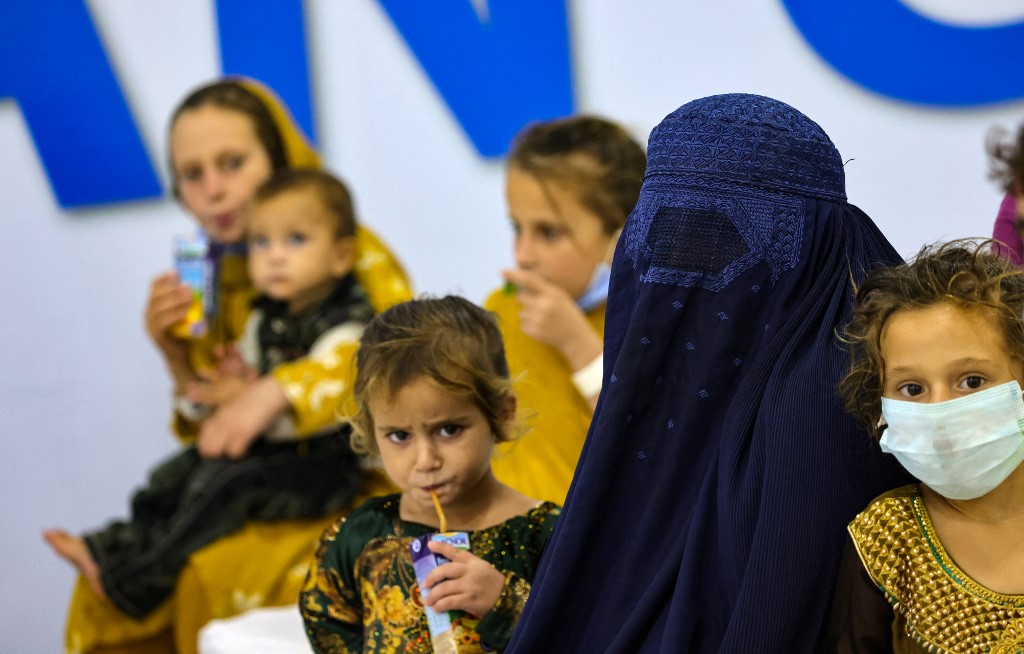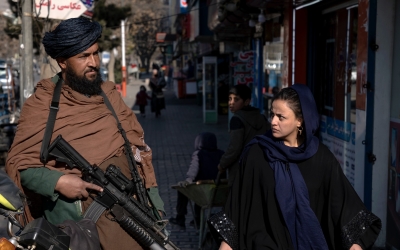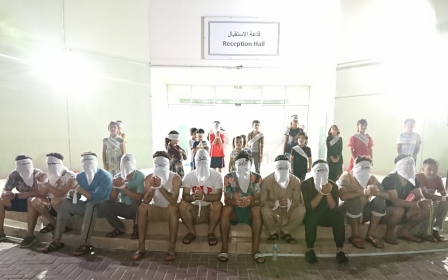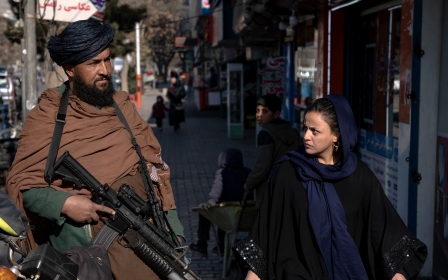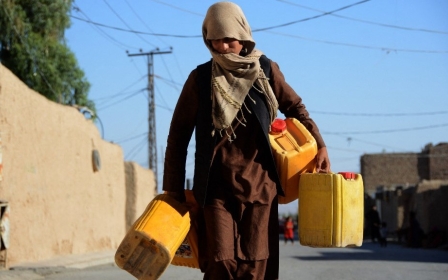Afghan MMA fighter recounts life in UAE resettlement camp
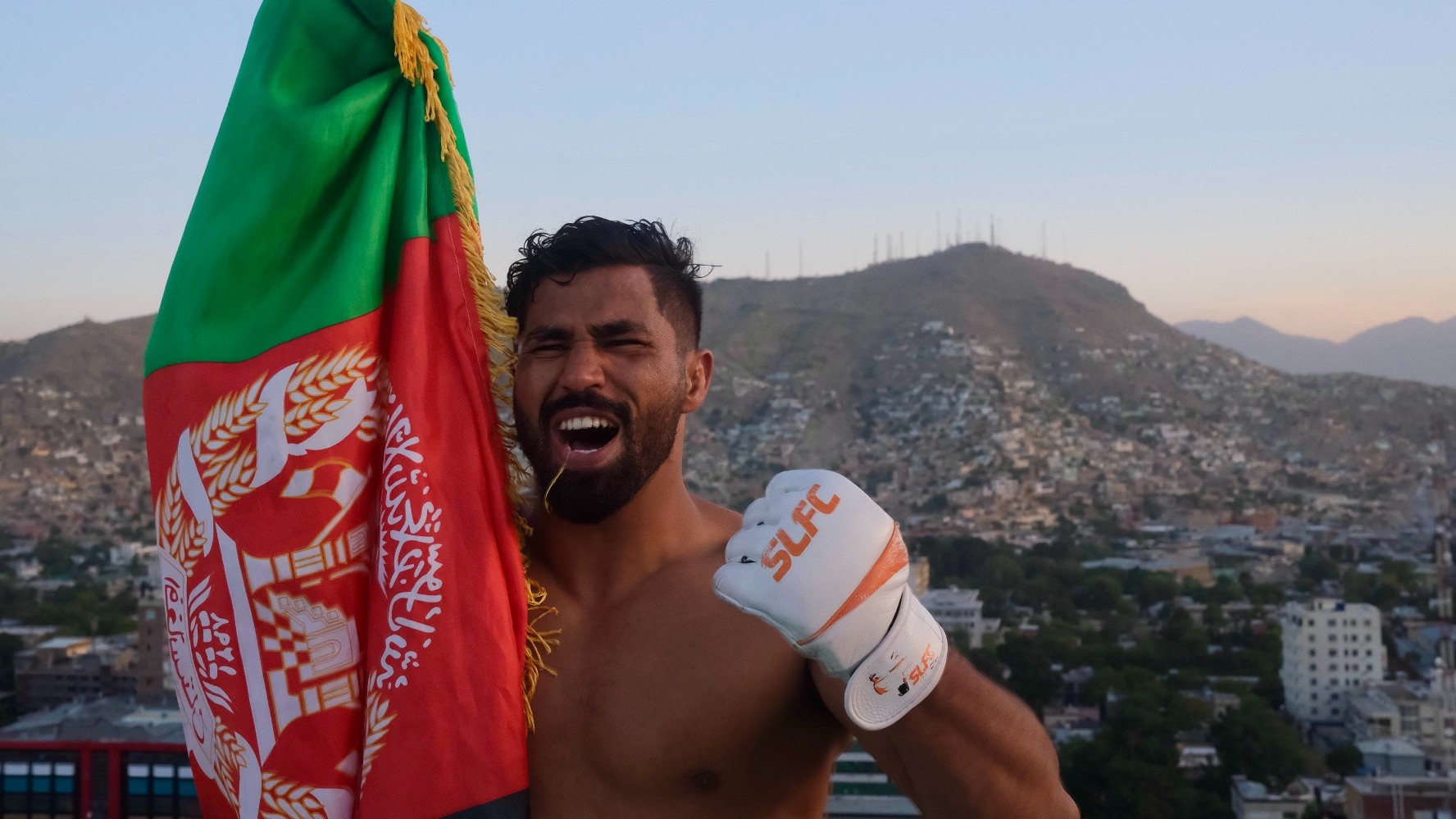
When Zaki Rasooli arrived in Abu Dhabi in October 2021, the mixed martial arts (MMA) fighter thought he’d only be in the Tasameem resettlement camp for a few days before being airlifted to the United States to start a new life.
Instead, he spent 18 months in “misery”.
By the time he arrived in the Emirati capital, it had only been two months since the Taliban had returned to power in Afghanistan, but it was already evident to Rasooli and other evacuees that the United Arab Emirates had far surpassed the 5,000 Afghans the country said it would house until they could be resettled in a third country.
Less than a month later, Rasooli and the 3,000 other Afghans in the camp lost even more hope when Washington suspended its daily chartered flights from the UAE to the US on 7 November.
As time went on and answers became more scarce, Rasooli said the Afghan evacuees began to feel suffocated in the “detention-like” conditions inside the camp, which he was told should have housed no more than 2,000 people.
New MEE newsletter: Jerusalem Dispatch
Sign up to get the latest insights and analysis on Israel-Palestine, alongside Turkey Unpacked and other MEE newsletters
According to Human Rights Watch, Tasameem Workers City, where the camp was based, was originally set up to hold apartment complexes for foreign workers, before quickly being remade into housing for the hundreds of Afghans arriving each day, fleeing the Taliban’s return.
Initially, Rasooli said, evacuees were even prevented from going for walks beyond the walls of the camp.
“The ocean was right there, but we could only see it from behind the wires and walls,” Rasooli told Middle East Eye by phone from Canada, where he was eventually relocated last month.
Prison cells
As a professional athlete, the limitations on physical activity were particularly devastating for Rasooli.
In Kabul, he had gone from being a mechanical worker to a professional fighter, training twice a day for his televised MMA fights.
Those bouts - including three professional wins - led to increasing fame for Rasooli, who became a brand ambassador for businesses and a Unicef polio vaccination programme for Afghan children.
Over the nine months Rasooli eventually spent in Tasameem, he says the camp became increasingly overcrowded and started to feel more and more like “a prison”, with guards stationed outside each housing area, an overabundance of security cameras and no freedom of movement.
“The rooms were like prison cells,” Rasooli says of the tight spaces that were used for eating, sleeping and even washing.
When he was transferred to the Emirates Humanitarian City (EHC) camp in the summer of 2022, conditions were no better.
He says the EHC was even more isolated than Tasameem. Like similar camps in Qatar, the Abu Dhabi facilities were located in industrial areas, far away from the glistening towers and shopping malls for which the Gulf is renowned. More importantly, the locations also left the evacuees susceptible to pollution and smog, with trees and greenery completely absent.
Rasooli said that within weeks of their arrival, evacuees in the EHC had started to become physically ill from the unclean air and humid Gulf weather.
As one of Afghanistan’s premier MMA fighters, Rasooli tried to persevere despite the camp’s conditions, particularly as it became clearer that he would be spending months, and not days, there. But by the beginning of 2022, he had started to suffer a mental breakdown.
“I just lost my mental peace,” he explains.
Like the other evacuees, Rasooli says he was most affected by the uncertainty of not knowing when they would be able to leave the camp and head off to their final destination.
'We were given repeated promises that we would be let out soon, but it was all false optimism'
- Zaki Rasooli, MMA fighter
There have been unconfirmed reports that at least one evacuee attempted suicide while in the EHC, and residents in a resettlement camp in Doha have recounted instances of attempted suicides and hunger strikes.
The fighter says that most evacuees were told they would be on their way to a third country within 15 to 30 days. Instead, they were forced to wait months at a time without clear updates.
“We were given repeated promises that we would be let out soon, but it was all false optimism.”
Answers from the US State Department were cryptic, according to Rasooli, and the Emirati workers in the camp - a mixture of Emirates Red Crescent, Abu Dhabi Police and the National Emergency Crisis and Disasters Management Authority (NCEMA) - had no information about Washington’s intentions for the thousands of people they had evacuated to the UAE.
“The Arabs didn’t seem to know what they were doing, they always seemed stressed.”
In October 2022, it was reported that a former Afghan Supreme Court judge, Sayed Yousuf Halim, had died in the EHC while waiting more than a year for his resettlement. UAE media quoted NCEMA to confirm Halim’s death.
Local media reported that former Afghan politicians had expressed their condolences for Halim’s death, which they also said took place while he was in the Abu Dhabi facility.
Last month, a UAE official told CNN that refugees at the EHC “received a comprehensive range of high-quality housing, sanitation, health, clinical, counselling, education and food services to ensure their welfare”, and that the UAE “continues to do everything it can to bring this extraordinary exercise in humanitarian resettlement to a satisfactory conclusion”.
The US State Department has said that it is “not aware of any verified allegations of human rights violations at EHC”.
US blocks Afghan transfers
In August 2022, by the first anniversary of the Taliban’s arrival in Kabul, the EHC started to erupt in protest, as the evacuees grew increasingly frustrated with deteriorating living conditions and, more importantly, the ambiguity surrounding their transfers away from the camps.
By October, President Joe Biden’s administration stopped the vast majority of relocations of Afghans to the US, after it introduced a new policy that no longer allows most Afghans to be admitted into the US based on humanitarian parole, a programme that allows temporary entrance into the United States but does not guarantee permanent residency.
Instead, White House spokesperson Karine Jean-Pierre said Afghan arrivals would “travel directly to communities where they will be moving with the help of refugee resettlement organisations, without a safe haven stopover in the United States”.
'Sport was what kept me alive in the camp. I realised the only remedy for this stressful, dreadful misery was training'
- Zaki Rasooli, MMA fighter
As a well-known Afghan, Rasooli was reluctant to take part in the first round of protests in February 2022. He decided to focus instead on “surviving” life in the camp and turned to what he knew best: sport. His depression and lack of activity had caused his blood pressure to routinely spike and even led him to gain 30 kilos in weight.
“Sport was what kept me alive in the camp,” Rasooli says. “I realised the only remedy for this stressful, dreadful misery was training.”
But with limited access to the outside world, securing the equipment necessary for proper training was not easy. At first, Rasooli began by focusing on bodyweight exercises to keep fit and control his weight. And then, when he was ready, Rasooli arranged for equipment to be donated to the camp, giving him the chance to return to his training, and the camp residents the opportunity to work out.
Stuck in limbo
An Afghan-American who had worked as a translator with the International Organization for Migration (IOM) in a similar resettlement camp in Qatar said the conditions Rasooli described were very similar to those in Doha.
The translator, who is not permitted to speak publicly, said the hold-up in getting Afghans out of Doha and Abu Dhabi was due to Washington’s slow vetting process. She said that over the past several months, Afghans have been given the option of repatriating to Taliban-ruled Afghanistan or being sent to Kosovo, where they would go through another round of vetting.
While in Kosovo, the evacuees were forced to wait until Washington could convince a third country to take in the Afghans the US had decided not to accept.
“Why would a third country want to take in people that the US had already rejected?” the translator said. She also pointed out that it could take years for international negotiations that would allow Afghan evacuees who had been promised resettlement in the US to be transferred from the Gulf into yet another country.
This, said the translator, forced the evacuees into a situation where “they were stuck unless they wanted to repatriate back” to Afghanistan, and were only provided with “minimal information” on the status of their case.
But the translator says that part of the issue facing the camps was the fact that they were initially set up as processing centres for US-issued Special Immigrant Visas (SIV), which are given to people employed by the US military and other US entities, before being repurposed for the task of processing refugees as well.
In general, the translator said SIV cases were processed within 30 to 60 days, while refugee cases took anywhere from nine to 12 months.
The translator said evacuees with less formal education and work experience often had their cases sorted more quickly than those who knew several languages and worked with a number of international organisations.
This, she said, led to “resentment” among those evacuees, who felt they were being held to a higher, more difficult standard.
By March, Human Rights Watch issued a report accusing the UAE of “arbitrarily” detaining between 2,400 and 2,700 Afghans in “cramped, miserable conditions with no hope of progress on their cases”.
Safely in Canada
A week after the HRW report, a top US diplomat issued an apology to the Afghan evacuees, but also admitted that some of the Afghans in the Abu Dhabi camp - which included well-known journalists, athletes, prosecutors and TV presenters - may never actually obtain a US visa. Rasooli believes there are still more than 1,000 Afghans at the camp.
All of this has left Rasooli with great resentment towards the US, which he accused of orchestrating “a chaotic withdrawal” after the Taliban entered Kabul. Now safely in Canada, Rasooli says he is glad he did not end up in the US after all.
Echoing the sentiments of many other Afghans, Rasooli says the US “made lots of things worse” in Afghanistan with its actions during the Taliban’s advance towards the capital, and the fall of the western-backed government.
He adds that, along with many others living in the camps, he started to “not like America” because of the treatment he received, making him turn away from the idea of living in the US.
And yet, despite all of the difficulties, Rasooli says life in the camp did prove one thing to him - that he really is a fighter.
“The camp really victimised us… But it also made me who I am today. I now know how to survive anything.”
Middle East Eye delivers independent and unrivalled coverage and analysis of the Middle East, North Africa and beyond. To learn more about republishing this content and the associated fees, please fill out this form. More about MEE can be found here.


